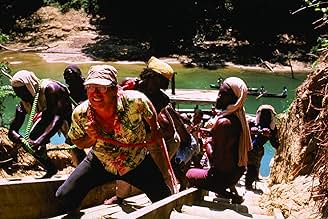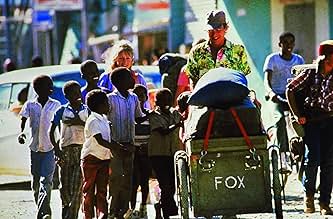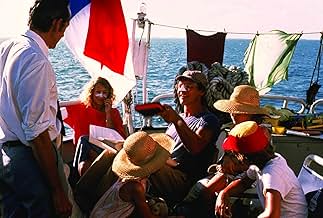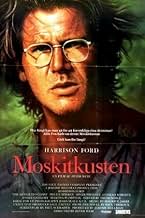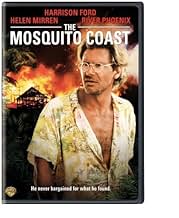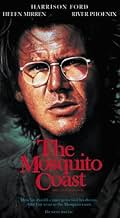Un inventore rifugge dalla vita di città e trasferisce la famiglia nelle giungle dell'America centrale per realizzare un'utopia.Un inventore rifugge dalla vita di città e trasferisce la famiglia nelle giungle dell'America centrale per realizzare un'utopia.Un inventore rifugge dalla vita di città e trasferisce la famiglia nelle giungle dell'America centrale per realizzare un'utopia.
- Premi
- 1 vittoria e 3 candidature totali
Alice Heffernan-Sneed
- Mrs. Polski
- (as Alice Sneed)
Recensioni in evidenza
The Mosquito Coast is an odd film. It attempts to talk about issues which are important and which few films address, fails to communicate them clearly, yet isn't sucked into the maelstrom of moralizing and sententiousness that films like this almost inevitably enter. Instead, it occupies some sort of odd middle ground of ambiguity and murkiness. One gets the feeling that the film is a lot like the Fox family: they know they're going upstream but they have no specific destination, and some of them really aren't sure why they're going there in the first place.
I felt from the very beginning that the film failed to define its ideals or set a sense of clear direction. Harrison Ford, in a performance which I found unconvincing (perhaps because of the inability of the film to articulate what motivated him), rambles on about everything from the Japanese to nuclear war. There's a large difference between subtlety, i.e. not spelling things out for the viewer, and incoherence. This was incoherent. We know that he's unhappy with America, but I don't know what he's really looking for, what motivates him, etc.. Maybe he doesn't know. But if that's the case, it should be made clear.
A good example of how this plays out is his attempt to bring ice to the "noble savages." Why does he do this? Because "ice is civilization." But why does he want to bring them civilization? It seemed to me that civilization was something he was having a lot of problems with. I assume that the novel explained this more clearly and the film failed to translate properly. He of course stated earlier in the film that the savages would probably think ice a sort of jewel. So? Why does this matter? Is he looking for lost innocence?
Then later in the film "Mother" says she wishes to go to Mr. Haddy's place. He responds "And live like savages?" I can only assume that he wishes to establish some sort of elementary civilization where a small community lives in peace and harmony. Or perhaps he's just looking to withdraw from everyone, as his spurning of Mr. Haddy's gifts would show. Also, a possible literary reference is the name of their craft, Victory, which is the name of a very dull Joseph Conrad novel about a man who withdraws from life and goes to live on an island. Extreme misanthropy? Unlikely.
A possible light at the end is his talk about man not being made to walk upright. Is he looking for some sort of return to primal existence? But then why invent air conditioning in Geronimo? It all adds up to a very disorganized mess, both in Mr. Fox's head, and on screen. The Mosquito Coast is like a puzzle that still has all the pieces, but rather than fit them together, Weir just threw them all in the box and let us look at them.
I felt from the very beginning that the film failed to define its ideals or set a sense of clear direction. Harrison Ford, in a performance which I found unconvincing (perhaps because of the inability of the film to articulate what motivated him), rambles on about everything from the Japanese to nuclear war. There's a large difference between subtlety, i.e. not spelling things out for the viewer, and incoherence. This was incoherent. We know that he's unhappy with America, but I don't know what he's really looking for, what motivates him, etc.. Maybe he doesn't know. But if that's the case, it should be made clear.
A good example of how this plays out is his attempt to bring ice to the "noble savages." Why does he do this? Because "ice is civilization." But why does he want to bring them civilization? It seemed to me that civilization was something he was having a lot of problems with. I assume that the novel explained this more clearly and the film failed to translate properly. He of course stated earlier in the film that the savages would probably think ice a sort of jewel. So? Why does this matter? Is he looking for lost innocence?
Then later in the film "Mother" says she wishes to go to Mr. Haddy's place. He responds "And live like savages?" I can only assume that he wishes to establish some sort of elementary civilization where a small community lives in peace and harmony. Or perhaps he's just looking to withdraw from everyone, as his spurning of Mr. Haddy's gifts would show. Also, a possible literary reference is the name of their craft, Victory, which is the name of a very dull Joseph Conrad novel about a man who withdraws from life and goes to live on an island. Extreme misanthropy? Unlikely.
A possible light at the end is his talk about man not being made to walk upright. Is he looking for some sort of return to primal existence? But then why invent air conditioning in Geronimo? It all adds up to a very disorganized mess, both in Mr. Fox's head, and on screen. The Mosquito Coast is like a puzzle that still has all the pieces, but rather than fit them together, Weir just threw them all in the box and let us look at them.
I have read the book and watched the film, and because of Harrison Ford's uncanny portrayal of the lead character he should have received an Oscar. There is an eerie scariness in the coming to life inventor- father to a mad scientist with humanistic touches. The book gave deep and colorful look at this man, but Ford alone made him transition from words to life. A deep look at someone with high ideals who becomes disillusioned at American way of life.
I can almost guarantee that anyone who has seen 'The Mosquito Coast', then looked at the subject line of this review, thinks I'm crazy. The truth is that this film is deeply flawed and undeniably weak in many regards, but it had a quality I cannot describe. This is the only film I have ever seen that, despite many shortcomings, manages to come out of the storm relatively unscathed, and become an unforgettable, almost haunting, movie.
The production values are immaculate. Peter Weir's direction is excellent, and is in top form here. He has crafted a thick shell that blocks the flaws from coming up to the surface, an indescribable feat that very few directors have accomplished. The musical score is good, not outstanding, but it's fitting, and surprisingly subtle. There is only about six minutes out of the entire film that has musical accompaniment, which makes for a very unique experience, and not necessarily a bad one. The tropical cinematography is dazzling, and the decision to shoot on location in Belize instead of on a studio back lot really paid off, contributing greatly to the film's success.
As good as the mentioned characteristics are, nothing is as good as the acting, especially that from the two leads: Harrison Ford and River Phoenix. Prior to this, Ford had made a name for himself with big budget action roles, with several failed attempts at drama (Hanover Street being the best example of that). It wasn't until 1985's 'Witness' (which Peter Weir also directed, that Ford was taken seriously as an all around actor. Personally I think Ford's performance here greatly overshadowed his work in 'Witness', and is a career best for him, even in the light of 'Regarding Henry' and 'Presumed Innocent', both made after his. He takes the character of Allie Fox, and moulds him into a selfish, driving maniac, blind to the wishes of others, only caring for himself. Phoenix, on the other hand, deserves even more acclaim, for several reasons. For one, this was only his third film, after 1985's 'Explorers', and 'Stand by Me', made right before this. Secondly, he was only 15 at the time of the shoot, and had little acting experience, yet he easily out acted most of his co-stars. Though his performance wasn't quite as refined as Ford's was, he still reached a level of near perfection and set the stage for a glorious, and ultimately tragic, career.
The story is one of utter genius, one of the few original ones popping up in an industry full of sequels, remakes and rip offs. Based on the 1981 bestseller by Paul Theroux, and co-starring Helen Mirren, 'The Mosquito Coast' deserves a place among the best films of the 80's.
But wait, I'm not done. Despite a great exterior, deep inside the movie is troubled. It's as if director Weir pushed all the movie's problems deep down under the surface, then piled layer after layer of... something, on top of it, hiding them from the clueless audience. My main problem with the movie is that it yearns to break away from it's literary roots, a problem that could've been easily avoided had the right script come along. Entire conversations are lifted from the text, and there isn't a single line that doesn't have an equal counterpart in the novel. For me this got extremely tedious as, hours before popping in the tape for a second viewing, I had finished the book, and the two are much too similar.
Another problem I have with it is that the scenes are much too short, with none of them running over about a minute and a half. An obvious result of this is that many subplots remain unresolved, and several concepts are hinted at, but go without further explanation, making for a confusing story. If the screenwriter had put a little more effort into making the film different than the book, with new scenes, we would have seen a much better end product.
A third, albeit a smaller one, is that the production team apparently spent too much time making sure that the movie would get a PG rating, though it would've been much better had it gotten an R, or even a PG-13 rating. That would've allowed Ford a little more breathing room to tweak his character, possibly allowing Allie to become less sympathetic, more of a madman.
I can't think of much more worth saying to put in this review, so I'll end it with this note: see the movie, even if you've read the book, but don't do the two back to back.
The production values are immaculate. Peter Weir's direction is excellent, and is in top form here. He has crafted a thick shell that blocks the flaws from coming up to the surface, an indescribable feat that very few directors have accomplished. The musical score is good, not outstanding, but it's fitting, and surprisingly subtle. There is only about six minutes out of the entire film that has musical accompaniment, which makes for a very unique experience, and not necessarily a bad one. The tropical cinematography is dazzling, and the decision to shoot on location in Belize instead of on a studio back lot really paid off, contributing greatly to the film's success.
As good as the mentioned characteristics are, nothing is as good as the acting, especially that from the two leads: Harrison Ford and River Phoenix. Prior to this, Ford had made a name for himself with big budget action roles, with several failed attempts at drama (Hanover Street being the best example of that). It wasn't until 1985's 'Witness' (which Peter Weir also directed, that Ford was taken seriously as an all around actor. Personally I think Ford's performance here greatly overshadowed his work in 'Witness', and is a career best for him, even in the light of 'Regarding Henry' and 'Presumed Innocent', both made after his. He takes the character of Allie Fox, and moulds him into a selfish, driving maniac, blind to the wishes of others, only caring for himself. Phoenix, on the other hand, deserves even more acclaim, for several reasons. For one, this was only his third film, after 1985's 'Explorers', and 'Stand by Me', made right before this. Secondly, he was only 15 at the time of the shoot, and had little acting experience, yet he easily out acted most of his co-stars. Though his performance wasn't quite as refined as Ford's was, he still reached a level of near perfection and set the stage for a glorious, and ultimately tragic, career.
The story is one of utter genius, one of the few original ones popping up in an industry full of sequels, remakes and rip offs. Based on the 1981 bestseller by Paul Theroux, and co-starring Helen Mirren, 'The Mosquito Coast' deserves a place among the best films of the 80's.
But wait, I'm not done. Despite a great exterior, deep inside the movie is troubled. It's as if director Weir pushed all the movie's problems deep down under the surface, then piled layer after layer of... something, on top of it, hiding them from the clueless audience. My main problem with the movie is that it yearns to break away from it's literary roots, a problem that could've been easily avoided had the right script come along. Entire conversations are lifted from the text, and there isn't a single line that doesn't have an equal counterpart in the novel. For me this got extremely tedious as, hours before popping in the tape for a second viewing, I had finished the book, and the two are much too similar.
Another problem I have with it is that the scenes are much too short, with none of them running over about a minute and a half. An obvious result of this is that many subplots remain unresolved, and several concepts are hinted at, but go without further explanation, making for a confusing story. If the screenwriter had put a little more effort into making the film different than the book, with new scenes, we would have seen a much better end product.
A third, albeit a smaller one, is that the production team apparently spent too much time making sure that the movie would get a PG rating, though it would've been much better had it gotten an R, or even a PG-13 rating. That would've allowed Ford a little more breathing room to tweak his character, possibly allowing Allie to become less sympathetic, more of a madman.
I can't think of much more worth saying to put in this review, so I'll end it with this note: see the movie, even if you've read the book, but don't do the two back to back.
Who hasn't wondered, considered, or fantasized about leaving this whole rat race beyond and go off somewhere remote to just do your own thing? I know I have and sometimes still do. Well, the main character here, play by Ford, does just that, and he brings his entire family along with him. Despite his good intentions they are all met with considerable obstacles and challenges throughout. There were times that I felt for his character, but even more so for his wife and kids being reluctantly pulled and pushed along on his obsession. There are definitely some issues with this film, one being a lack of clarity in its message, but I still think it is worth checking out.
With much of Harrison Ford's career during the eighties dominated by his participation in George Lucas and Spielberg blockbusters, it comes as a relief to discover that in between his numerous flights on the Milennium Falcon and slashing his whip he found time to star in many low key movies. Among these hidden treasures is The Mosquito Coast, a character driven story about one mans attempt to recreate an Eden in a faraway land. And his secret to survival? Ice.
This is an interesting movie, not only because it has an all star cast, that includes River Phoenix, but because we see Harrison Ford give his all to creating a character that is multi dimensional. He is an idealist and has the best intentions, yet is doomed to failure as the viewer senses an impeding violent side to his vision which will come to destroy him.
As a movie this is a good study of man's attempt to act upon his dreams, as a lighthearted pop corn flick this will annoy the average mainstream cinema goer. Simply put, many people will find it hard to imagine Harrison Ford as anything else other than the super hero incarnation of Indiana Jones, and multi faceted anti heroes that never see the errors of their ways is a genre of cinema that Hollywood hasn't quite got their head around yet.
For everybody else who would like to see a movie that has depth, great acting and a solid script, this will be excellent viewing.
This is an interesting movie, not only because it has an all star cast, that includes River Phoenix, but because we see Harrison Ford give his all to creating a character that is multi dimensional. He is an idealist and has the best intentions, yet is doomed to failure as the viewer senses an impeding violent side to his vision which will come to destroy him.
As a movie this is a good study of man's attempt to act upon his dreams, as a lighthearted pop corn flick this will annoy the average mainstream cinema goer. Simply put, many people will find it hard to imagine Harrison Ford as anything else other than the super hero incarnation of Indiana Jones, and multi faceted anti heroes that never see the errors of their ways is a genre of cinema that Hollywood hasn't quite got their head around yet.
For everybody else who would like to see a movie that has depth, great acting and a solid script, this will be excellent viewing.
The Life and Times of Harrison Ford
The Life and Times of Harrison Ford
Take a look back at Harrison Ford's movie career in photos.
Lo sapevi?
- QuizWhile building the town set in Belize, the crew unearthed an ancient Mayan temple. It notified the Belize government, which declared the site an important historical find.
- BlooperThe "Ice from Fire" technique for using heat, ammonia and hydrogen was actually invented in 1824 by the English scientist Michael Faraday.
- Citazioni
Emily Spellgood: [to Charlie] I think about you when I go to the bathroom.
- Colonne sonoreClap Your Hands
Words and Music by Gary Johnson
Performed by Grace Gospel Primary School Choir
I più visti
Accedi per valutare e creare un elenco di titoli salvati per ottenere consigli personalizzati
- How long is The Mosquito Coast?Powered by Alexa
- Who are the three men that Allie meets in the remote village and who come to Jeronimo later? Why were they hiding when Allie and his party arrived?
- Early in the film Allie presents his machine to a farmer but the farmer scoffs and rejects it. Why didn't he want it?
- Why did Allie tell the armed men that his village was infested with ants?
Dettagli
Botteghino
- Budget
- 25.000.000 USD (previsto)
- Lordo Stati Uniti e Canada
- 14.302.779 USD
- Fine settimana di apertura Stati Uniti e Canada
- 110.313 USD
- 30 nov 1986
- Lordo in tutto il mondo
- 14.302.779 USD
- Tempo di esecuzione1 ora 57 minuti
- Colore
- Mix di suoni
- Proporzioni
- 1.85 : 1
Contribuisci a questa pagina
Suggerisci una modifica o aggiungi i contenuti mancanti

Divario superiore
By what name was Mosquito Coast (1986) officially released in India in English?
Rispondi



